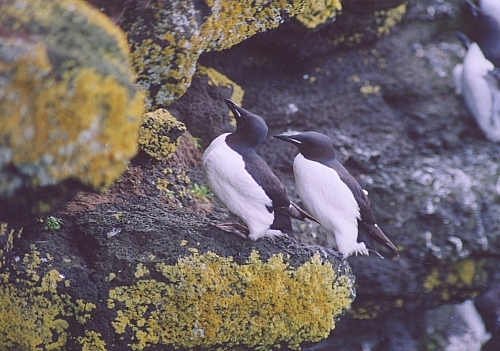(video added) |
m (→External Links) |
||
| Line 22: | Line 22: | ||
{{GSearch|Uria+lomvia}} | {{GSearch|Uria+lomvia}} | ||
<br /> | <br /> | ||
| − | {{Video|Brunnich' | + | {{Video|Brunnich's_Guillemot}} |
*[http://www.orientalbirdimages.org/birdimages.php?action=birdspecies&Bird_ID=1010&Bird_Image_ID=13180&Bird_Family_ID=106 View more images of this species on Orientalbirdimages] | *[http://www.orientalbirdimages.org/birdimages.php?action=birdspecies&Bird_ID=1010&Bird_Image_ID=13180&Bird_Family_ID=106 View more images of this species on Orientalbirdimages] | ||
*[http://www.gaviatravel.com/index.php?option=com_content&task=view&id=35&Itemid=65 Where to find Brunnich's Guillemots/Thick-billed Murre in Iceland] | *[http://www.gaviatravel.com/index.php?option=com_content&task=view&id=35&Itemid=65 Where to find Brunnich's Guillemots/Thick-billed Murre in Iceland] | ||
[[Category:Birds]] [[Category:Bird Songs]] [[Category:Uria]] | [[Category:Birds]] [[Category:Bird Songs]] [[Category:Uria]] | ||
Revision as of 10:23, 6 June 2010
| This article is incomplete. This article is missing one or more sections. You can help the BirdForum Opus by expanding it. |
Alternative name: Brunnich's Guillemot
- Uria lomvia
Identification
40-44cm. Black head, neck, back and wings, white underparts, long and pointed bill. They have a small rounded black tail. The lower face becomes white in winter.
Distribution
High Arctic of Europe, Asia and North America.
Taxonomy
Habitat
Coasts and islands.
Behaviour
They breed in large colonies on coastal cliffs, a single egg being laid directly on a cliff ledge.
They forage for food by using their wings to swim underwater. They are accomplished divers. The diet includes invertebrates and a few fish; the chicks are fed fish, squid, crustaceans and other small invertebrates.
Vocalisation
<flashmp3>Uria lomvia (song).mp3</flashmp3>
Listen in an external program
External Links




